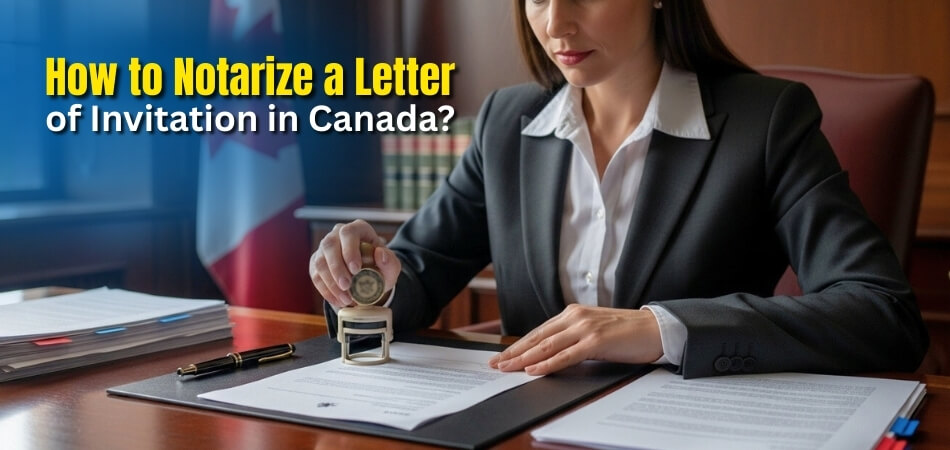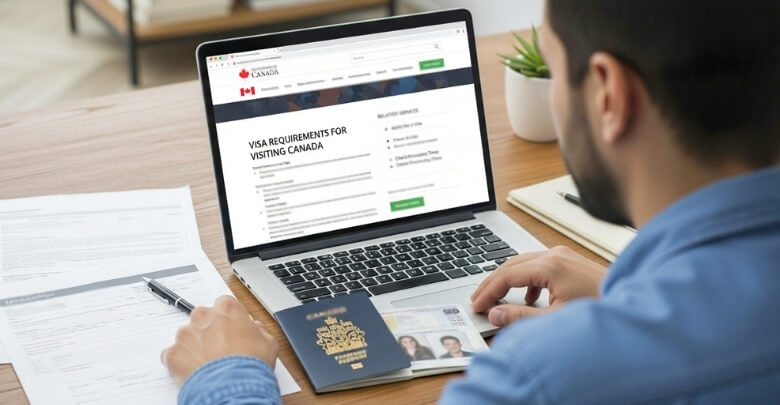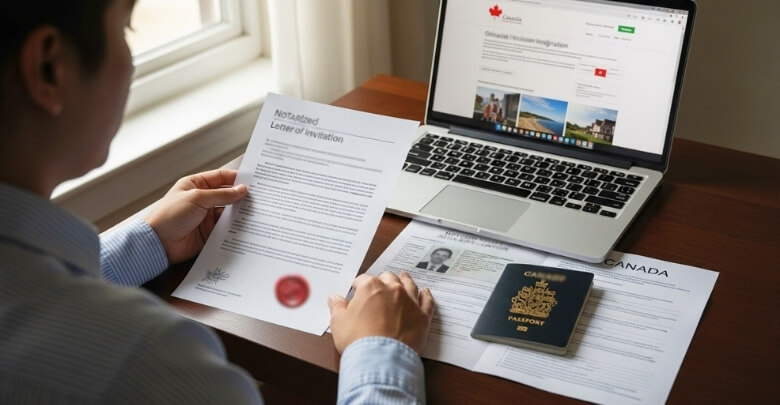Visiting Canada is an exciting plan filled with opportunities to meet family, attend events, or take part in business activities. To apply for a visa, you often need documents that explain your purpose of travel. One important document in certain cases is a notarized invitation letter, and many people wonder about how to notarize a letter of invitation in Canada.
A notarized invitation letter in Canada is written by the host, such as a friend, family member, or organization. It must include details of both host and guest, like names, addresses, passport numbers, and travel purpose. If required, the host presents the draft to a notary public. Once notarized, the letter becomes legally valid for visa application use.
Do you want to know when this letter is needed, who can notarize it, or what documents the host must carry? Then keep reading, because this article covers every important detail about notarizing an invitation letter for Canada—in a simple and clear way.
How to Notarize a Letter of Invitation in Canada?
Getting a notarized invitation letter in Canada can be difficult at first, but it gets easier once you understand the procedure. The steps involve both the host in Canada and the guest applying for the visa. Let’s go through each step in detail.
Confirm the Need
First, check if you actually need a notarized invitation letter. Not everyone applying for a visa to Canada is asked for one. For short tourist trips, it is often not required. However, for family visits, conferences in Canada, business, or academic stays, many visa offices may request it. Knowing this early saves you stress and avoids unnecessary work.
Contact the Host
The host in Canada is the one responsible for preparing the invitation letter. This host could be a friend, relative, company, event, or even an institution. They should clearly include both their details and your details in the draft. A good draft letter avoids delays or the need for corrections later. Here’s a pre-made email template for getting in touch with the host:
Subject: Request for Invitation Letter for Visa Application
Dear [Host’s Name],
I hope you are doing well. I am writing to ask for your support in preparing an invitation letter for my Canadian visa application. The immigration office requires this letter to show the purpose of my visit and confirm that I have a reliable host in Canada.
The letter usually needs to include your full name, address, contact details, and status in Canada, as well as my details, such as full name, passport number, and the purpose and duration of my stay. Some visa offices may also request the letter to be notarized.
If you need a sample draft or any extra details from me, please let me know, and I will provide them right away. Once the letter is ready, you can send it to me either as a scanned copy or the original, depending on the consulate’s requirement.
Thank you very much for helping me with this. I really appreciate your support.
Warm regards,
[Your Full Name]
[Your Contact Information]
Draft the Letter
The draft should include all the main details, such as names, passport numbers, addresses, contact information, and the purpose of the visit. For business or company invitations, official details like registration numbers should be added. The draft should look professional, complete, and free of errors. A well-prepared draft makes the next steps smoother.
Visit the Notary
In most cases, an invitation letter does not have to be notarized. But some Canadian visa offices, especially for business visitors, may ask for it. If required, the host in Canada can take the draft to a notary public, where the notary will check the details, stamp it, and confirm the signature. This makes the letter officially notarized only if the visa office has requested it. Below is a sample of a Canadian notarized invitaion letter:
[Host’s Full Name]
[Host’s Full Address in Canada]
[City, Province, Postal Code]
[Phone Number / Email Address]Date: [DD/MM/YYYY]
To Whom It May Concern,
I, [Host’s Full Name], residing at [Full Address in Canada], would like to invite my [relationship, e.g., brother, sister, friend], [Guest’s Full Name], who lives at [Guest’s Address], to visit me in Canada. The purpose of this visit is to spend time together and to attend [state reason, e.g., family gathering, conferences in Canada, or business meetings].
The planned visit will take place from [Start Date] to [End Date]. During this time, [Guest’s Name] will stay at my residence, and I will provide accommodation and support. I confirm that I am a [citizen/permanent resident] of Canada.
Sincerely,
[Host’s Signature]
[Host’s Full Name]
Notary Public Section
[Seal/Stamp of Notary Public]
Notary Public Name: ___________________________
Signature: ___________________________
Commission Number: ___________________________
Send to Guest
After notarization, if asked for, the host needs to send the invitation letter to you. Some Canadian visa offices ask for the original copy, while others may accept a scanned version. It is important to check the exact requirements of the visa office handling your application. Always keep the document safe until you submit it.
Add to Visa File
Once you have the invitation letter, add it to your visa application. It should be attached along with your passport, forms, photos, and other required documents. This letter supports your application by showing the visa officer that you have a clear purpose and a reliable host in Canada. Submitting it properly strengthens your case.
Final Checks
Before submission, double-check that all details in the invitation letter match your visa forms and passport. Even small spelling errors can cause problems. Make sure the letter is signed, complete, and easy to read. A correct and clear letter helps avoid unnecessary delays.
What Documents Does a Host Need Before Visiting a Notary?
Before visiting a notary in Canada for an invitation letter, the host must be ready with the right paperwork. Having these documents prepared avoids delays and makes the notarization process quick. Below is a list of the most common requirements.
|
Document |
Purpose |
|
Government-issued ID |
To prove the host’s identity (e.g., passport, driver’s license). |
|
Proof of residence |
For confirming the host’s Canadian address (e.g., utility bill, lease, or bank statement). |
|
Immigration status document |
To show the host is legally in Canada (e.g., Canadian passport, PR card, work permit). |
|
Completed draft letter |
The prepared invitation letter with all guest and host details. |
|
Guest’s details |
Copy of the guest’s passport and contact information to add to the letter. |
|
Supporting documents |
If for business, include company details such as registration or tax info. |
|
Occasion proof (if needed) |
Documents showing the reason for the visit (e.g., conference invite, family event plan). |
|
Payment method |
Some notaries may require a fee, so the host should carry cash or a card. |
How Can You Check if Your Canadian Visa Office Requires a Notarized Invitation Letter?
It is not always clear if your visa office will ask for a notarized invitation letter. Different offices may have different rules depending on the type of visit and where you are applying from. Knowing how to confirm this saves time and avoids mistakes. Here are the ways you can check it.
Check the Official Website
The first step is to visit the official website of Immigration, Refugees and Citizenship Canada (IRCC). Each visa office has its own page with specific rules. Carefully read the section about supporting documents for visitor visas. If notarization is needed, it will be clearly listed there.
Review Visa Office Instructions
Visa offices often post their own instruction sheets online. These instructions may differ from country to country. Look for the page of the Canadian embassy or consulate in your region. The instructions will guide you on whether the invitation letter needs to be notarized.
Contact Local Embassy
If you cannot find clear information online, you can contact the local Canadian embassy or consulate. They usually provide answers through email or phone. Make sure to ask directly about notarized invitation letters. Getting confirmation this way avoids confusion later.
Check Visitor Type
The requirement can depend on the type of visit. For simple tourism, notarization is not usually asked for. But if you are visiting for business, family events, or attending a conference, your visa office might have a requirement for notarizing an invitation letter, depending on your location. Checking the visit type helps you know what applies in your case.
Read Application Checklist
Most visa offices give applicants a checklist of documents. Go through this checklist carefully before applying. If a notarized letter is required, it will be listed as part of the mandatory documents. This checklist is one of the easiest ways to confirm.
Ask Your Host
Sometimes, the visa office may send extra instructions to the host in Canada. Your host can check with a local notary or directly with the consulate if notarization is needed. It is always better for the host to confirm before preparing the letter. Below is a simple and polite email template you can use to ask your host in Canada about whether the invitation letter needs to be notarized:
Subject: Question About Invitation Letter
Hi [Host’s Name],
I hope you are doing well. I am working on my Canadian visa application, and I wanted to ask if you could please check whether the visa office requires the invitation letter to be notarized.
Sometimes the rules can be different depending on the type of visit and the visa office. If you can confirm this with a local notary or the Canadian consulate, it would help me a lot.
Once we know for sure, we can prepare the letter properly so there are no delays in my application.
Thank you very much for your support.
Best regards,
[Your Full Name]
[Your Contact Information]
Who Can Notarize a Letter of Invitation in Canada?
Preparing an invitation letter for a Canadian visa may sometimes require notarization. In such cases, the letter must be signed and confirmed by an authorized person. Knowing who can notarize in Canada helps you avoid mistakes and delays. Let’s look at the main options.
Notary Public
The notary public is the most common person to notarize documents in Canada. They are legally approved by the province or territory to witness signatures and certify documents as official. When the visa office asks for a notarized invitation letter, a notary public is the safest choice. Their stamp and signature make the letter legally recognized.
Commissioner of Oaths
A commissioner of oaths can witness signatures and take sworn statements. However, their authority is often limited to documents used inside their province. This means that for immigration purposes, a commissioner of oaths may not always be accepted. It is better to confirm with the visa office if this option is allowed.
Lawyer
Some lawyers in Canada are also notaries, depending on the province. A lawyer who has notary powers can notarize your invitation letter just like a notary public. In provinces where lawyers need special approval, you should first check if your lawyer is registered as a notary. This is especially true for notaries in Victoria, where legal rules may differ slightly. This ensures the letter will be valid for visa purposes.
Is it Expensive to Notarize a Letter of Invitation in Canada?
Many people often wonder how much it really costs to notarize a letter of invitation in Canada. Fees can vary depending on where you live, the notary’s rates, and the province’s rules. Most notaries charge per signature or per document rather than having one fixed price. Because of this, it is always smart to ask about the fee before booking your appointment.
Notary fees are not the same everywhere, so it helps to compare a few options in your area. Some notaries charge as little as fifteen dollars, while others may charge thirty or more per document. In most cases, the process is simple and fast, which keeps the fee within an affordable range. Having a clear idea of costs in advance will help you manage your visa budget better.
People often worry whether the cost of notarizing a letter of invitation in Canada is higher than expected. The good news is that the fee is usually affordable, especially compared to the importance it adds to your visa application. The notarized letter provides strong support, which can make a difference in the approval process. That small payment is often worth the peace of mind it provides.
How Long Is a Canadian Notarized Letter of Invitation Valid?
The validity of a Canadian notarized invitation letter usually depends on the purpose of the visit and the visa timeline. Most of the time, the letter is considered valid until the specific dates of the planned trip. Immigration officers look at the start and end dates written in the invitation carefully. This is why it is important to match those dates with your actual travel plans without mistakes.
A notarized invitation letter is not a permanent document that remains valid for months after the visit dates pass. Once the time frame mentioned in the letter has expired, the document loses its value. If your travel plans change, a new letter may be required. Providing up-to-date details helps to avoid confusion during your visa application review.
For business visits, family events, or conferences, the notarized letter is valid only for the period stated inside it. Immigration offices expect consistency between your visa application and the notarized letter provided by your host. Submitting an expired or outdated document can cause delays or even rejection. Preparing a fresh letter whenever plans shift is the safest way to keep your file strong.
When Do You Need a Canadian Notarized Invitation Letter?
Many people applying for a Canadian visa are unsure if a notarized invitation letter is really needed. The answer depends on the type of visit, the visa office, and the specific requirements. Knowing when it is required helps you prepare better. Let’s look at the most common situations.
Family Visits
When you plan to visit family members in Canada, the visa office may ask for a notarized invitation letter. This is especially true if you are staying for a long period of time. The letter confirms that you have a host in Canada who supports your stay. It adds credibility to your application and shows that the purpose of your visit is genuine.
Business Trips
For business-related visits, such as meetings or company work, some visa offices may require a notarized invitation letter. The host company in Canada usually provides this letter. It includes company details, your role, and the purpose of the visit. Always confirm the exact requirement with the visa office handling your application.
Academic Purposes
If you are invited by a Canadian school, university, or research center, you may be asked for a notarized letter. This is more common for exchange programs, research projects, or academic conferences. The institution will prepare the letter and may notarize it for added formality. It confirms the academic nature of your stay.
Special Events
People traveling for weddings, cultural programs, or religious events may also be asked for notarized invitation letters. These letters explain the reason for your visit and where you will stay. It helps visa officers understand your connection to the event. Having the letter notarized adds extra assurance.
Conferences
When you are attending professional or international conferences in Canada, some visa offices request a notarized invitation letter. The organizing body may provide this document. It highlights your role in the event and the dates of participation. A notarized copy can strengthen your visa file.
Long-Term Visits
A longer stay does not automatically mean notarization is required. Some visa offices may ask for it, depending on their rules. These letters show that the host is confirming responsibility for your stay. Always check the visa office instructions to know for sure.
Visa Office Rules
Not every visa office asks for notarization, but some do, depending on local procedures. Always check the office instructions before applying. If notarization is required, the host in Canada must visit a notary. Following the rules of your visa office is the safest approach.
Does the Notarized Letter of Invitation Guarantee a Visa Approval?
Many applicants believe that a notarized invitation letter automatically guarantees their Canadian visa approval, but this is not true. The notarization adds credibility and shows that the host’s statement is official, but approval depends on more. Immigration officers always check the applicant’s background, financial ability, and purpose of travel. Without these factors meeting the requirements, the notarized letter alone will not secure a visa.
Having a notarized letter definitely strengthens your application by proving that your host in Canada is serious and officially supports your stay. It adds a sense of reliability to the documents you provide with your application. However, it is only one part of the larger package that immigration officers review carefully. Other documents like your passport, financial proof, and travel history are equally important.
It is wise to treat a notarized letter as supportive evidence rather than a guaranteed ticket for visa approval. Officers must ensure that all conditions set by immigration law are met before granting the visa. This means your eligibility, background, and purpose of travel must still be clear. Using the notarized invitation letter properly increases your chances, but it cannot replace the need for complete requirements. For the supporting documents that strengthen the application alongside the notarized letter, click on the download button below.
Frequently Asked Questions
Before applying for a Canadian visa, many people get confused about the notarized invitation letter. Below are the most asked questions with clear answers. These cover practical details that were not already explained in the main guide.
Can a Notarized Invitation Letter Be Written in Any Language?
A notary invitation letter should usually be written in English or French, Canada’s official languages. If it is written in another language, a certified translation will be required. This ensures that immigration officers can clearly understand the details. Submitting a translated copy alongside the original makes the process smoother.
Is a Digital Signature Accepted on Invitation Letters?
Canadian visa offices normally require a handwritten signature on invitation letters. Digital signatures are not always accepted for immigration purposes. If notarization is required, the notary will need the host’s physical presence and signature. Always confirm with the specific visa office before submitting a digital version.
How Long Does It Take to Notarize an Invitation Letter?
The notarization process itself is usually quick, often taking less than thirty minutes once you meet the notary public. What often causes delays is missing paperwork or incomplete details in the draft letter. If everything is ready, the process is smooth. Always confirm the notary’s availability in advance.
What Type of Websites Show Where to Get Notarized Letter Services?
Government and law society websites provide reliable lists of licensed notaries. These are safer than random online ads. If you are searching for where to get notarized letter services online, always double-check licensing and credentials to avoid unqualified providers.
Which Provinces Allow Online Notarization of Invitation Letters?
Not all provinces in Canada allow online notarization, but places like Ontario and British Columbia have provisions for it. Online notarization uses secure video calls and digital seals. However, immigration offices do not always accept this format. Always confirm with your visa office before relying on it.
How Do You Renew an Expired Invitation Letter?
Once the dates inside the invitation letter have passed, it becomes invalid. To renew, the host must prepare a new draft with updated dates and details. If notarization is required, the new version must be notarized again. Immigration offices only accept current documents.
Which Mistakes Commonly Delay Invitation Letters?
Common mistakes include missing passport numbers, incorrect names, or forgetting to sign the document. Poor formatting and unclear handwriting can also cause problems. Even small spelling errors may raise questions. Double-checking details before notarization helps avoid costly and time-consuming delays.
How Do You Confirm a Notary’s Legitimacy?
You can confirm a notary’s legitimacy by checking their license through the provincial regulator or legal society. Most provinces have online directories. Immigration officers only accept notarization done by authorized professionals. Avoid using individuals who cannot prove their official status.
Final Thoughts
Taking the first step toward notarizing a letter of invitation in Canada might feel confusing at the start—but it doesn’t have to stay that way. Once you understand who needs it, what documents are involved, and how the process works, things become much more manageable.
Whether you’re inviting family, attending a conference, or planning a longer stay, the notarized letter can be an important part of your visa application. It shows a real connection between you and your host and gives extra support to your reason for visiting Canada.
Now that you know how to notarize a letter of invitation in Canada, the next step is to stay organized and follow your visa office’s exact instructions. A clear plan today can save you time, stress, and trouble later.









